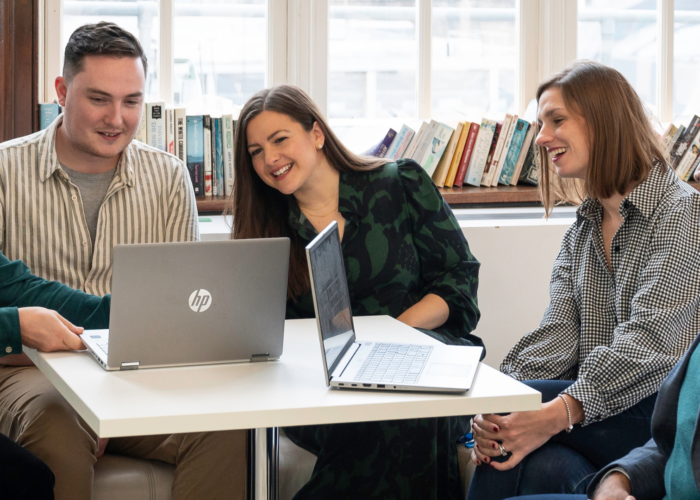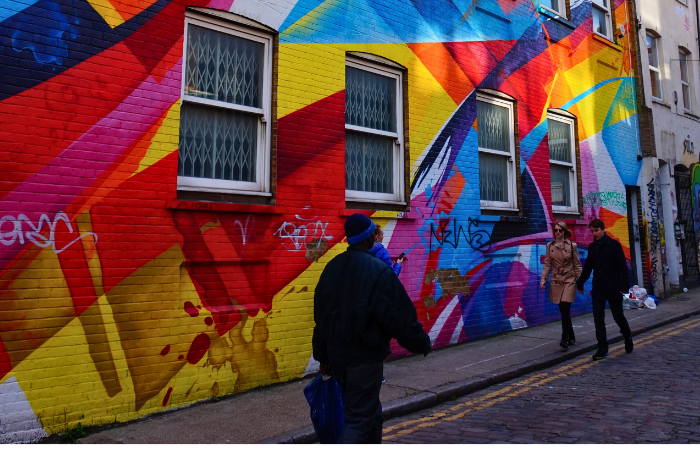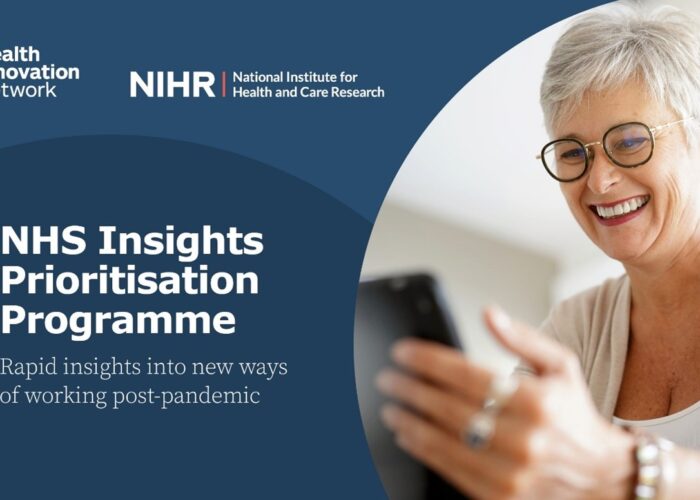By Clare Thomson, Innovation Lead

Often innovation gets mistaken for invention in healthcare, where transformation is rarely about coming up with something completely new. Instead, it’s about looking at a problem differently and working together in a different way to deliver something simpler, more efficient, more effective for all.
Our recent work on the post-Covid triage pathway redesign is a clear example of this, and a project where the most ‘new’ element was arguably the problem we needed to solve. The World Health Organisation suggests that 10-20% of people suffer with a variety of mid- and long-term side effects after having been infected with the disease, while the Office for National Statistics believes that there are 2.3 million people in the UK experiencing self-reported ‘long-Covid’ symptoms. To deliver on their ambition to have a simpler, more equitable assessment and treatment pathway for people with post-Covid syndrome, ICHP supported the North West London (NWL) Integrated Care System (ICS) Local Care team in three key areas: redesigning the NWL post-Covid referral pathway; implementation of a supported self-management app; and designing a tiered model of care. As such, we were able to transform services to a single point of access, hosted in the community that not only simplified the referral process and pathway for both GPs and patients, but also delivered on more streamline collaboration across the entire pathway, delivering patients better care.
Whilst the ideas themselves in their individuality were not new, bringing them together in a whole-system collaborative approach was the first-of-its-kind in London. The model is a brilliant example of cross-provider collaboration, but most excitingly, it’s entirely replicable and has since become the new preferred model in the updated post-Covid commissioning guidance. Complications to people’s health as a result of the pandemic may have been the burning platform for change this project was commissioned from, but there has never been a better time to apply the same urgency and principles to more transformation in NWL to solve other priorities locally. Let’s learn from our fire-fighting early days of the pandemic to make healthcare easier to access, simpler to deliver and more efficient for all.
Let’s be single-minded about a single-point of access
The referral pathway we co-designed with patients and clinicians across acute, community and primary care settings comprises a single point of access triage service across NWL for all post-Covid referrals. This means that there is equity of access to care for all post-Covid patients in NWL and staff are able to develop expertise in both triage and treatment. The key to delivering it lies in data-sharing, strong information governance protocol and good electronic referral systems. All of which can be achieved if everyone is pulling in the same direction. For example, NWL community teams were not fully utilising their electronic record system for referrals but as a result of this project, community teams were trained how to use it.
The key to delivering it lies in data-sharing, strong information governance protocol and good electronic referral systems. All of which can be achieved if everyone is pulling in the same direction.
Let’s make use of Community capacity
Prior to the project, expertise in post-Covid was being built up by community teams but not being effectively used. Furthermore, the waiting lists were mounting in the acute sector. In the new model, the point of access is hosted and staffed in the community by allied health professionals (AHPs) working in post-Covid services, with support from primary and secondary care. This has meant more efficient use of the community services, prevented waiting lists building up even more in the acute sector. It has also meant that more patients were being referred and assessed for treatment more quickly and only those who really needed it were being sent for further medical investigations.
Let’s engage patients in their own care and self-management
As part of a wider treatment offer for this patient cohort in NWL, we helped identify a supported self-management solution – the Living With Covid Recovery app – which helps people to manage their recovery at home. This digital solution enables multidisciplinary teams of clinicians to manage and monitor a shared caseload of patients efficiently and allows patients to interact directly with their care team to access regular support. We supported information governance approval at a NWL level, facilitated training for community teams, developed a standard operating procedure (SOP) and approach for using the solution in NWL, identified ‘champion’ users, and set-up a learning forum to drive further iterations of best practice approaches. Working in this way aided implementation because we were able to do some of the work at a regional level to speed up the processes at an individual care setting level. For example, with getting the appropriate Information Governance for the app at a NWL level, accelerated the process for individual providers.
Let’s focus on wellness, rather than illness
Finally, we worked with clinicians to set up a tiered model of treatment offer across NWL: Tier 0 is self-management information, collated as a central resource, and reviewed by clinicians to ensure it was the most up to date evidence-based information, which can be shared with patients at any point along the pathway; Tier 1 is the Living With app; Tier 2 is a wellbeing group therapy offer, co-designed with therapists; Tier 3 are specialist groups for people with more specific needs, such as brain fog. These specialist groups allowed for appropriate care of everyone on the pathway, regardless of the severity of their illness. Patients are also provided with 1:1 sessions, if that is the most appropriate form of treatment. The groups and the use of the app enable a new way of thinking, moving away from illness toward wellness and patients taking ownership for their care. The learnings from this way of working can also be taken forward, and used for people with other long term conditions
Let’s learn and share as we go
A key remit of our AHSN commission is about supporting the spread of good ideas. But spread starts with learning, which we will be delivering through our evaluation at the end of the financial year. I can’t wait to see what comes of this review and look forward to sharing with teams across the sector.



